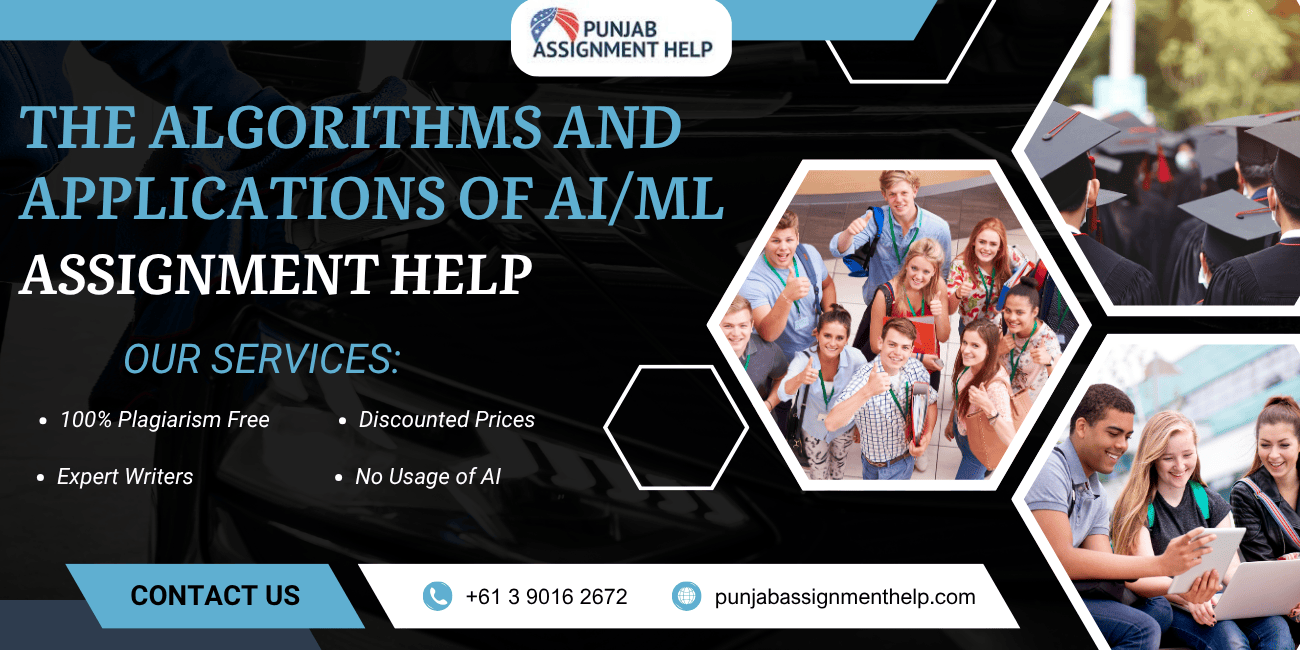
| Subject Code: | TECH3200 | ||
| Subject Name: | Artificial Intelligence and Machine Learning in IT | ||
| Assessment Title: | The Algorithms and Applications of AI/ML | ||
| Assessment Type: | Side Deck | ||
| Word Count: | 600 Words | /13 Slides | (+/-10%) |
| Weighting: | 20% | ||
| Total Marks: | 20 | ||
| Submission: | My KBS | ||
| Due Date: | Week 5 | ||
Your first assessment requires you to apply the concepts learnt during the first four weeks of the subject, as well as researching the supplied references in this document.
Get Plagiarism free Assignment help from Punjab Assignment Help
The slide deck is an individual Power Point presentation explaining some concepts learnt related to AI/ML. You are expected to research the supplied references and review workshop slides to develop a good understanding of the different types of ML algorithms and the applications, especially how they are going to support the business.
Thelearningoutcomesyouwilldemonstrateinperformingthisassessmentincludes:
Online Assignment Help in Australia
| LO 1: | Evaluate artificial intelligence algorithms in information technology |
| LO 2: | Analyse machine learning and common algorithms |
You are required to create an individual slide deck with dot points and illustrations as per the following:
| Criteria | F (Fail) 0–49% | P (Pass) 50–64% | C(Credit) 65 – 74% | D(Distinction) 75 – 84% | HD (High Distinction) 85 – 100% | Mark |
| Industry 4.0 | Characteristics of industry 4.0 are not described and no illustration of the difference between industry 4.0 and 3.0 | Characteristics of industry 4.0 are not clearly described and limited illustration of the difference between industry 4.0 and 3.0 with limited understanding of the concept referring to the supplied articles | Characteristics of industry 4.0 are reasonably good described and some illustration of the difference between industry 4.0 and 3.0 with understanding of the concept referring to the supplied articles | Characteristics of industry 4.0 are well described and illustration of the difference between industry 4.0 and 3.0 with understanding of the concept referring to the supplied articles | Characteristics of industry 4.0 are excellently described and clear illustration of the difference between industry 4.0 and 3.0 with well understanding of the concept referring to the supplied articles | /3 |
| Fundamentals of AI and ML | Poor or no description of AI and ML with no analysis and justification of the relationship between AI and ML. Provide poor or no example with the applications in business for each AI and ML | Reasonably ok description of AI and ML with limited analysis and justification of the relationship between AI and ML. Provide limited examples with the applications in business for each AI and ML with evidence of research and understanding of the concepts | Good description of AI and ML with reasonable analysis and justification of the relationship between AI and ML. Provide examples with the applications in business for each AI and ML with evidence of research and understanding of the concepts | Very good description of AI and ML with complete analysis and justification of the relationship between AI and ML. Provide clear examples with the applications in business for each AI and ML with evidence of research and understanding of the concepts | Excellent description of AI and ML with comprehensive analysis and justification of the relationship between AI and ML. Provide clear examples with the applications in business for each AI and ML with strong evidence of research and understanding of the concepts | /4 |
| Types of Machine Learning | Poor or no analysis of supervised and unsupervised learning algorithms and provide poor or no examples with the applications in business for each. Poor or no contrast and analysis of the difference | Reasonably ok analysis of supervised and unsupervised learning algorithms and provide limited examples with the applications in business for each. Limited contrast and analysis of the difference | Good analysis of supervised and unsupervised learning algorithms and provide clear examples with the applications in business for each. Good contrast and analysis of the difference | Very good analysis of supervised and unsupervised learning algorithms and provide clear examples with the applications in business for each. Very good contrast and analysis of the difference | Excellent analysis of supervised and unsupervised learning algorithms and provide clear examples with the applications in business for each. Comprehensive contrast and analysis of the difference | /6 |
| Python Libraries in Machine Learning | Poor or no analysis of three Python libraries that are commonly used for machine learning and poor or nocontrast among the libraries | Reasonably ok analysis of three Python libraries that are commonly used for machine learning but limited contrast among the libraries | Good analysis of three Python libraries that are commonly used for machine learning and clear contrast among the libraries | Very good analysis of three Python libraries that are commonly used for machine learning and very clear contrast among the libraries | Excellent analysis of three Python libraries that are commonly used for machine learning and comprehensive contrast among the libraries | /4 |
| Presentation and reference | Poor structure and clarity. No reference, major grammar and spelling issues | Reasonable structure and headings. 2 references cited. Some grammatical or spelling issues | Good structure and presentation, headings for different slides, 3 references cited. Reasonable grammar and spelling | Very good structure and presentation, headings for different slides, 4 references cited.Grammar and spelling are very good | Excellent structure and presentation,easy to follow, headings for different slides, 5 or more references cited. Excellent grammar and spelling | /3 |
Feed back and grades will be released via My KBS | Total: /20 |
https://www.kbs.edu.au/admissions/forms-and-policies
KBS values academic integrity. All students must understand the meaning and consequences of cheating, plagiarism and other academic offences under the Academic Integrity and Conduct Policy.
Please read the policy to learn the answers to these questions:
https://www.kbs.edu.au/admissions/forms-and-policies
 |
Penalties may be applied for assessment submissions that exceed prescribed limits.
Students may seek study assistance from their local Academic Learning Advisor or refer to the resource son the My KBS Academic Success Centre page. Further details can be accessed at https://elearning.kbs.edu.au/course/view.php?id=1481
Please see the level of Generative AI that this assessment is Level 2 has been designed to accept:
Traffic Light | Amount of Generative Artificial Intelligence (Generative AI) usage |
Evidence Required | This assessment (✓) |
Level 1 |
Prohibited: No Generative AI allowed This assessment showcases your individual knowledge,skills and/or personal experiences in the absence of Generative AI support. |
The use of generative AI is prohibited for this assessment and may potentially result in penalties for academic misconduct,including but not limited to a mark of zero for the assessment. | |
Level 2 |
Optional: You may use Generative AI for research and content generation that is appropriately referenced.
See assessment instructions for details This assessment allows you to engage with Generative AI as a means of expanding your understanding,creativity,and idea generation in the research phase of your assessment and to produce content that enhances your assessment. I.e., images. You do not have to use it. |
The use of Gen AI is optional for this assessment.
Your collaboration with Generative AI must be clearly referenced just as you would reference any other resource type used. Click on the link below to learn how to reference Generative AI. https://library.kaplan.edu.au/referencing-other-sources/referencing-other-sources-generative-ai
In addition, you must include an appendix that documents your Generative AI collaboration including all prompts and responses used for the assessment.
Unapproved use of generative AI as per assessment details during the content generation parts of your assessment may potentially result in penalties for academic misconduct, including but not limited to a mark of zero for the assessment. Ensure you follow the specific assessment instructions in the section above. |
✓ |
Level 3 |
Compulsory:
You must use Generative AI to complete your assessment
See assessment instruction for details This assessment fully integrates Generative AI, allowing you to harness the technology's full potential in collaboration with your own expertise.
Always check your assessment instructions carefully as there may still be limitations on what constitutes acceptable use, and these may be specific to each assessment. | You will be taught how to use generative AI and assessed on its use.
Your collaboration with Generative AI must be clearly referenced just as you would reference any other resource type used.Click on the link below to learn how to reference Generative AI.
https://library.kaplan.edu.au/referencing-other-sources/referencing-other-sources-generative-ai In addition, you must include an appendix that documents your Generative AI collaboration including all prompts and responses used for the assessment.
Unapproved use of generative AI as per assessment details during the content generation parts of your assessment may potentially result in penalties for academic misconduct, including but not limited to a mark of zero for the assessment. Ensure you follow the specific assessment instructions in the section above. |


Get original papers written according to your instructions and save time for what matters most.